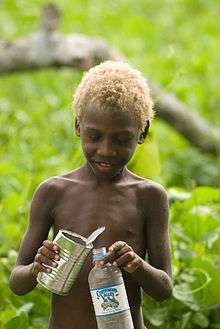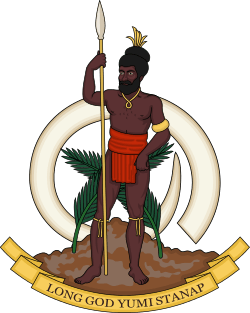Ni-Vanuatu
Ni-Vanuatu is a large group of closely related Melanesian ethnic groups native to the island country of Vanuatu. As such, Ni-Vanuatu are a mixed ethnolinguistic group with a shared ethnogenesis that speak a multitude of languages.[1][2][3][4] It is more frequently used than the demonym Vanuatuan, which is regarded as incorrect by some authors and style guides.[5][6][7]
 | |
| Total population | |
|---|---|
| c. 300,000 | |
| Regions with significant populations | |
| Languages | |
| English, Bislama, French, over 100 Oceanic languages | |
| Religion | |
| Christian (Presbyterian, Anglican, Roman Catholic), Animism | |
| Related ethnic groups | |
| other Melanesian peoples |
This recent coinage builds on the particle ni, which in some indigenous languages encodes the genitive, similar to the English 'of'. Thus Ni-Vanuatu literally means 'of Vanuatu'.
The term is mostly used in English and French, and is hardly used in Bislama, the country’s lingua franca,[8] let alone in the indigenous languages of the archipelago.
Ni-Van is sometimes used as an abbreviation of Ni-Vanuatu. This term was pejorative in its original usage in the 1980s by Anglophone European expatriates, similar to its French equivalent les nis, but according to New Zealand linguist Terry Crowley by the 2000s the term Ni-Van saw increasing usage among Ni-Vanuatu.[9]
See also
References
- "RAMSI Mourns Death of Senior ni-Vanuatu Police Officer". Solomon Times. 28 April 2009. Retrieved August 30, 2011.
- "Ni-Vanuatu arrested NZ", Radio Vanuatu, March 10, 2009
- "Des Ni-Vanuatu en final des Masters", Agence universitaire francophone, July 31, 2008
- "Ni-Vanuatu workers employed under RSE scheme set to increase". Radio New Zealand International. February 18, 2008. Retrieved October 30, 2011.
- Rowlings, Gregory (2016). "Asymmetrical ambiguities: the 'White Australia policy', travel, migration and citizenship in Vanuatu, 1945–1953". In Leckie, Jacqueline; McCarthy, Angela; Wanhalla, Angela (eds.). Migrant Cross-Cultural Encounters in Asia and the Pacific. London: Taylor and Francis. ISBN 9781317096672.
- Fenelon, Judy (2002). AusAID style guide (PDF). Australian Agency for International Development. p. 79. OCLC 225052411. Archived from the original (PDF) on 17 April 2012. Retrieved 14 November 2018.
- "V". Guardian and Observer style guide. Guardian Media Group. 5 November 2015. Retrieved 14 November 2018.
- Bislama more commonly uses phrases such as man Vanuatu ("V. person" or "V. people") or blong Vanuatu ("of V.").
- Crowley, Terry (2003). "Ni-Van". A New Bislama Dictionary. Fiji: University of the South Pacific. ISBN 9789820203624.
